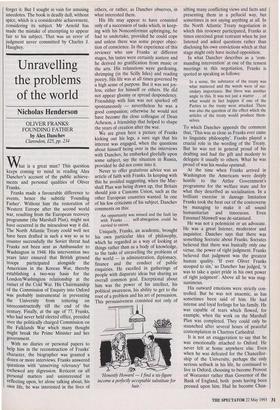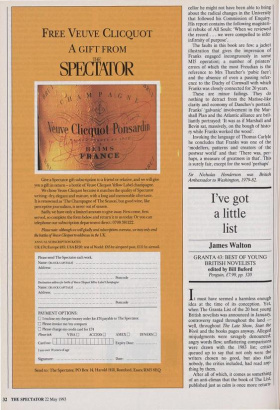Unravelling the problems of the world
Nicholas Henderson
OLIVER FRANKS: FOUNDING FATHER by Alex Danchev
Clarendon, £25, pp. 234
hat is a great man? This question keeps coming to mind in reading Alex Danchev's account of the public achieve- ments and personal qualities of Oliver Franks.
Franks made a favourable difference to events, hence the subtitle 'Founding Father'. Without him the restoration of Western Europe after the second world war, resulting from the European recovery programme (the Marshall Plan), might not have occurred in the miraculous way it did. The North Atlantic Treaty could well not have been drafted in such a way so as to counter successfully the Soviet threat had Franks not been sent as Ambassador to Washington in 1948. His intervention two years later ensured that British ground troops participated alongside the Americans in the Korean War, thereby establishing a two-way basis for the London/Washington relationship at the outset of the Cold War. His Chairmanship of the Commission of Enquiry into Oxford was probably instrumental in preventing the University from tottering on unreconstructedly till the end of the century. Finally, at the age of 77, Franks, who had never held elected office, presided over the politically charged Commission on the Falklands War which many thought might break the Prime Minister and her government.
With no diaries or personal papers to help him in the reconstruction of Franks' character, the biographer was granted a dozen or more interviews. Franks answered questions with 'unnerving relevancy' but eschewed any digression. Reticent on all personal matters and uninterested in reflecting upon, let alone talking about, his own life, he was interested in the lives of others, or rather, as Danchev observes, in what interested them.
His life may appear to have consisted only of a succession of tasks which, in keep- ing with his Nonconformist upbringing, he had to undertake, provided he could cope and unless there was some proper objec- tion of conscience. In the experience of this reviewer who saw Franks at different stages, his tastes were certainly austere and he derived no gratification from music or the arts. His relaxations were gardening, shrimping (in the Scilly Isles) and reading poetry. His life was at all times governed by a high sense of purpose. But it was not joy- less, either for himself or others. He did not appear gloomy or spread despondency. Friendship with him was not sparked off spontaneously — nevertheless he was a good companion; otherwise he would not have become the close colleague of Dean Acheson, a friendship that helped to shape the years of creation after the war. We are given here a picture of Franks kicking out his legs, a sure sign that his interest was engaged, when the questions about himself being over in the interviews with Danchev, he embarked gleefully upon some subject, say the situation in Russia, provided he did not come into it. Never to offer gratuitous advice was an article of faith with Franks. In keeping with this he avoided suggesting, when the Mar- shall Plan was being drawn up, that Britain should join a Customs Union, such as the other European countries wanted. In one of his few criticisms of his subject, Danchev comments on this:
An opportunity was missed and the fault lay with Franks ... self-abnegation could be carried to excess.
Uniquely, Franks, an academic, brought his own particular idea of philosophy, which he regarded as a way of looking at things rather than as a body of knowledge, to the tasks of unravelling the problems of the world — in administration, diplomacy, finance and the conduct of public enquiries. He excelled in gatherings of people with disparate ideas but sharing an overall common goal. Exceptional about him was the power of his intellect, his political awareness, his ability to get to the root of a problem and his art of persuasion. This persuasiveness consisted not only of Honestly Howard — I find a six-figure income a perfectly acceptable substitute for hair.' sifting many conflicting views and facts and presenting them in a pellucid way, but sometimes in not saying anything at all. In the North Atlantic Treaty negotiation in which this reviewer participated, Franks at times exercised great restraint when he just listened and asked questions rather than disclosing his own convictions which at that stage might only have incited opposition.
In what Danchev describes as a 'com- manding intervention' at one of the tensest meetings in this negotiation, Franks is quoted as speaking as follows:
In a sense, the substance of the treaty was what mattered and the words were of sec- ondary importance. But there was another angle to this. It was not just a matter . . of what would in fact happen if one of the Parties to the treaty were attacked. There was also the question of the effect which the articles of the treaty would produce them- selves.
To which Danchev appends the comment that, 'This was as close as Franks ever came to linguistic philosophy'. Franks played a crucial role in the wording of the Treaty. But he was not in general proud of his drafting and had the gift and modesty to delegate it usually to others. What he was proud of was his modus operandi.
At the time when Franks arrived in Washington the Americans were deeply hostile to the Attlee Government's programme for the welfare state and for what they described as socialisation. In a brilliant exercise in damage limitation Franks took the heat out of the controversy by managing to make it all sound humanitarian and innocuous. Even Emanuel Shinwell was de-satanised.
He was not a polemicist or an advocate. He was a great listener, moderator and inquisitor. Danchev says that there was something Socratic about Franks. Socrates believed that there was basically only one virtue, the power of right judgment. Franks believed that judgment was the greatest human quality. 'If ever Oliver Franks stooped to sin,' so Danchev has judged, 'it was to take a quiet pride in his own power of right judgment'. Above all he was mag- nanimous.
His outward emotions were strictly con- trolled. But he was not anaemic, as has sometimes been said of him. He had intense and loyal feelings for his family. He was capable of tears which flowed, for example, when the work on the Marshall Plan was completed. They could only be staunched after several hours of peaceful contemplation in Chartres Cathedral.
It is not an exaggeration to say that he was emotionally attached to Oxford. He never felt at home anywhere else. Even when he was defeated for the Chancellor- ship of the University, perhaps the only serious setback in his life, he continued to live in Oxford, choosing to become Provost of Worcester rather than Governor of the Bank of England, both posts having been pressed upon him. Had he become Chan- cellor he might not have been able to bring about the radical changes in the University that followed his Commission of Enquiry. His report contains the following magisteri- al rebuke of All Souls: 'When we reviewed the record . . . we were compelled to infer infirmity of purpose'.
The faults in this book are few: a jacket illustration that gives the impression of Franks engaged incongruously in some MI5 operation; a number of printers' errors of which the most Freudian is the reference to Mrs Thatcher's 'pubic face'; and the absence of even a passing refer- ence to the Duchy of Cornwall with which Franks was closely connected for 20 years.
These are minor failings. They do nothing to detract from the Matisse-like clarity and economy of Danchev's portrait. Franks' galvanic' involvement in the Mar- shall Plan and the Atlantic alliance are bril- liantly portrayed: 'It was as if Marshall and Bevin sat, massively, on the bough of histo- ry while Franks worked the wood'.
Invoking the language of Thomas Carlyle he concludes that Franks was one of the `modellers, patterns and creators of the postwar world' and that: 'There was, per- haps, a measure of greatness in that'. This is surely fair, except for the word 'perhaps' Sir Nicholas Henderson was British Ambassador to Washington, 1979-82.



















































 Previous page
Previous page